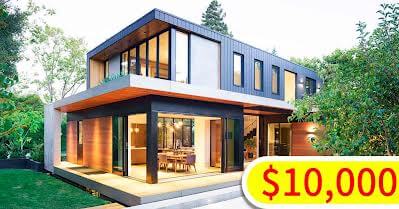In an era of rising housing costs and growing environmental awareness, modular homes are emerging as a smart, sustainable alternative to traditional construction. These customizable, factory-built residences offer faster timelines, cost savings, and modern designs—all while minimizing waste. Whether you’re a first-time homebuyer, downsizing, or seeking an eco-friendly living solution, this guide explores the benefits of modular homes and shares expert tips to help you navigate the process.

What Are Modular Homes?
Modular homes are built in sections (modules) within a controlled factory environment, then transported to the building site for assembly. Unlike mobile or manufactured homes, they adhere to the same local building codes as site-built houses and are permanently affixed to a foundation. This method ensures precision, quality control, and flexibility in design.
Key Benefits of Modular Homes
1. Cost Efficiency
- Lower construction costs: Factory production reduces labor and material waste, saving 10–20% compared to traditional builds.
- Predictable budgeting: Fixed-price contracts minimize surprises from weather delays or supply chain issues.
- Energy savings: Many modular homes include energy-efficient features (e.g., insulation, solar panels), lowering utility bills.
2. Speed of Construction
- Faster timelines: Modules are built indoors while site prep (e.g., foundation) happens simultaneously, cutting build time by 30–50%.
- Weather-proof process: Indoor construction avoids delays from rain, snow, or extreme heat.
3. Customization and Design Flexibility
- Work with architects to create layouts tailored to your lifestyle, from cozy cottages to multi-story family homes.
- Choose finishes, fixtures, and eco-friendly materials (e.g., bamboo flooring, low-VOC paints).
4. Sustainability
- Reduced waste: Factories recycle excess materials and optimize resource use.
- Energy-efficient designs: Options like passive solar heating, rainwater harvesting, and smart home tech align with green living goals.
5. Durability and Quality
- Strict factory inspections ensure compliance with building codes.
- Modules are engineered to withstand transportation stresses, often making them sturdier than site-built homes.
Expert Tips for Buying or Building a Modular Home
1. Research Reputable Builders
- Look for companies with certifications from the Modular Home Builders Association (MHBA) or positive reviews on platforms like BBB and Google.
- Visit model homes or request virtual tours to assess craftsmanship.
2. Secure Financing Early
- Modular homes qualify for traditional mortgages, but lenders may require the home to be fully assembled and inspected before releasing funds.
- Explore construction-to-permanent loans or FHA options for streamlined financing.
3. Plan for Land and Site Preparation
- Land ownership: You’ll need to own or purchase a lot zoned for modular homes.
- Site prep costs: Budget for foundation installation, utility connections, and landscaping.
4. Optimize Your Design
- Prioritize open floor plans and multi-functional spaces to maximize square footage.
- Consider future needs: Aging-in-place features (e.g., step-free entries) or expandable modules for growing families.
5. Understand Local Regulations
- Check zoning laws, HOA rules, and permit requirements in your area.
- Ensure your builder handles transportation logistics and obtains necessary permits.
6. Inspect Thoroughly
- Hire an independent inspector to review the factory-built modules and site assembly.
- Verify warranties covering structural defects, roofing, and plumbing/electrical systems.
7. Embrace Energy Efficiency
- Invest in high-performance windows, LED lighting, and ENERGY STAR® appliances.
- Explore renewable energy add-ons, such as solar panels or geothermal heating.
Common Myths Debunked
- Myth: “Modular homes look cheap or generic.”Reality: Modern modular designs rival traditional homes in style, with options for vaulted ceilings, custom cabinetry, and luxury finishes.
- Myth: “They don’t appreciate in value.”Reality: Modular homes appreciate similarly to site-built homes when well-maintained and anchored to a permanent foundation.
- Myth: “Financing is difficult.”Reality: Lenders treat modular homes like traditional houses once installed, making financing accessible.
Is a Modular Home Right for You?
Modular homes are ideal for:
- Budget-conscious buyers seeking quality without compromise.
- Eco-conscious individuals prioritizing sustainability.
- Those needing faster move-in timelines (e.g., relocating for work).
- Retirees downsizing to low-maintenance, single-story layouts.
Conclusion: Building Your Future, One Module at a Time
Modular homes represent a revolutionary shift in residential construction, combining affordability, speed, and sustainability. By partnering with a trusted builder, planning meticulously, and tailoring your design, you can create a home that reflects your values and lifestyle. As the housing market evolves, modular living isn’t just a trend—it’s a practical, forward-thinking solution for modern homeowners.
Final Tip: Attend modular home expos or virtual seminars to connect with builders and ask questions. With the right preparation, your dream home could be just a few modules away!
By embracing innovation and informed decision-making, you’ll unlock the full potential of modular living—a smarter, greener, and more affordable path to homeownership.









